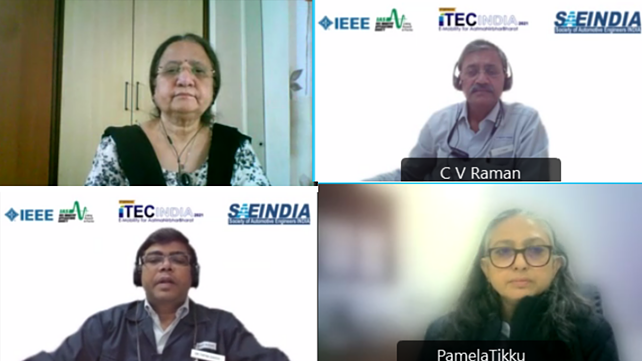
Nonprofit engineering and scientific society SAEINDIA is organising the 4th edition of iTEC India 2021 in collaboration with IEEE IAS USA.
This physical event will be held from 16th to 18th December 2021 at Manesar, Gurugram, Haryana. The event is expected to be attended by delegates from over 16 countries.
This meet assumes great significance because the Indian Automotive market will grow rapidly and is slated to become the 3rd largest in the world by 2030.
Rashmi Urdhwareshe, President, SAEINDIA and, Former Director, ARAI, highlighted the importance and need for this international meet where experts worldwide will participate. Incidentally, SAEINDIA would also be commencing the Silver Jubilee celebrations this year, culminating in a Grand Finale event in November 2022.
She said that SAEINDIA is well known in the engineering community as the ultimate destination for knowledge dissemination and skill enrichment for engineering professionals in India. This meet will enhance the skills of all participants, she added.
C V Raman, CTO, MSIL, and Patron of the event, said that with support from the government of India and other policymakers, massive work has to be done in building the supporting infrastructure and ecosystem for faster adoption of electric vehicles. Some of the important priorities and policy interventions will be discussed during the 3-day conference, and experts from India, the USA, France, and Germany will share their experiences to find pragmatic solutions to the challenges that lie ahead.
“The key question about raw material imports of lithium and cobalt needs to be addressed for long-term self-reliance and sustainable development of electric mobility in India. We must also look at alternative options to fossil fuels, like Green Hydrogen, Solar Energy, Fuel Cells, etc,” he added.
Dinesh Tyagi, Chair - Steering Committee, iTEC India 2021, emphasised the importance of the conference’s theme, reflecting the 7C’s propounded by the Prime Minister of India to accelerate self-reliance as we move towards achieving the goal of an ‘Aatmanirbhar Bharat’. It is a daunting task to build a huge supporting infrastructure in the form of charging stations, swappable batteries, and a reduction in the weight of the batteries. This is required to ensure a smooth transition to electric vehicles across segments, including public transportation like electric buses and trucks.
He added that the recent example of the Indian Auto industry leapfrogging from BS-IV to BS-VI within a short period had demonstrated the capabilities of Indian OEM’s to achieve seemingly impossible targets in a short period.
Dr Tapan Sahoo, Chair - Organising Committee of iTEC India 2021, gave an overview of the event. The conference will have five plenary sessions and four parallel technical sessions with 100+ technical papers on eight topics related to ‘Transportation Electrification’. In addition, technical experts from India and abroad will deliberate on issues related to sustainable mobility in India, focusing on ‘Start-up Innovation’ for faster adoption of electric mobility.
Dr Sahoo added that the government of India has rolled out a PLI Scheme - “National Programme on Advanced Chemistry Cell (ACC) Battery Storage (NPACC)”. An outlay of INR 18,100 crore ($ 2.49 billion) has been earmarked by the government towards this scheme, which is intended to establish a local manufacturing capacity of 50 Gigawatt Hour (GWh) of ACC.
He added that the Indian Automobile market, from being the 5th largest today, is all set to become the 3rd largest by the end of this decade.
Replying to a query on India’s commitment at COP 26 and the challenges and opportunities for the Indian automotive industry, C V Raman said, “This is in line with PM Narendra Modi’s vision of Panchamrit, taking non-fossil energy capacity to 500 GW by 2030, meet 50% of its energy requirements till 2030 with renewable energy, reduce projected carbon emission by one billion tonnes by 2030. Besides, the country will reduce the carbon intensity of its economy by 45% by 2030 and achieve net zero by 2070.”
“We have a need for energy, as we are a growing economy. We need to work towards national goals. I am sure iTEC 2021 will help to create that platform and do that. We need to look at various options of non-fossil fuels such as natural gas, electric mobility with renewables, biofuels and green hydrogen,” he added.